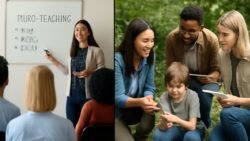SBS B.Ed. College – How SBS B.Ed. College Blends Traditional Teaching Methods With Modern Educational Technology focuses on creating a learning environment where classical pedagogical approaches coexist seamlessly with contemporary digital tools. SBS B.Ed. emphasizes traditional teaching techniques such as lectures, group discussions, storytelling, and chalk-and-talk methods, which have long been effective in building conceptual understanding, communication skills, and classroom management abilities. At the same time, the college integrates modern educational technology to enhance engagement, facilitate personalized learning, and prepare students for 21st-century classrooms. Tools such as interactive smartboards, e-learning platforms, and digital lesson plans are used alongside conventional methods, creating a blended learning ecosystem. Research highlights that combining traditional and technology-driven instruction enhances learning outcomes and improves retention (Zhang et al., 2019). By adopting this approach, SBS B.Ed. ensures that future educators not only grasp fundamental teaching principles but also acquire digital competencies necessary to navigate modern classrooms effectively.

Integration of Digital Tools With Conventional Pedagogy
At SBS B.Ed., digital tools are seamlessly integrated into classic teaching methodologies to create a dynamic and interactive learning environment. Smartboards, projectors, and multimedia resources are employed to complement lecture-based teaching, allowing students to visualize complex concepts and participate actively in classroom discussions. Learning Management Systems (LMS) like Moodle and Google Classroom provide platforms for submitting assignments, taking quizzes, and engaging in collaborative learning outside traditional class hours. Blended learning approaches encourage students to explore topics independently using digital resources while reinforcing core concepts through discussion and in-person teaching. Studies indicate that incorporating digital tools in teacher training enhances student engagement, critical thinking, and problem-solving skills (Means et al., 2019). This integration ensures that future teachers are well-versed in both conventional instructional strategies and modern digital teaching methods.
Preserving Traditional Methods While Embracing Technological Innovation
While technology enhances the learning experience, SBS B.Ed. maintains a strong emphasis on time-tested teaching methods that foster creativity, critical thinking, and social-emotional development. Techniques such as storytelling, role-playing, debates, and peer teaching are integral parts of the curriculum, helping students develop empathy, communication skills, and classroom management expertise. To blend tradition with innovation, instructors design hybrid lesson plans that combine face-to-face instruction with technology-enhanced activities like virtual simulations and digital assessments. Research published in the International Journal of Educational Research confirms that hybrid teaching approaches improve comprehension, engagement, and retention. By balancing traditional methods with modern tools, SBS B.Ed. ensures that its graduates can adapt to diverse educational settings and meet the evolving demands of 21st-century classrooms, while retaining the pedagogical foundation essential for effective teaching.
 Our Vision & Mission – Building a Community of Committed, Competent, and Compassionate Teachers
Our Vision & Mission – Building a Community of Committed, Competent, and Compassionate Teachers
Practical Application Through Smart Classrooms and E-Learning
SBS B.Ed. emphasizes practical exposure through smart classrooms and e-learning modules. Classrooms equipped with interactive whiteboards, projectors, and multimedia content simulate real-life teaching scenarios, allowing students to practice lesson delivery, classroom management, and student engagement strategies. E-learning modules, including video lectures, online quizzes, and discussion forums, provide flexible access to learning material and encourage self-paced study. Research shows that hands-on experience with technology-enhanced teaching significantly improves teacher preparedness and instructional effectiveness (Tamim et al., 2019). By engaging with both traditional and modern tools, SBS B.Ed. students gain a holistic understanding of teaching practices, ensuring they are capable of designing and delivering lessons that are both pedagogically sound and technologically enriched.
Faculty Development and Continuous Technological Updates
A key factor in successfully blending traditional and modern methods at SBS B.Ed. is faculty training. Teachers undergo regular professional development programs to stay updated on emerging technologies, digital teaching strategies, and innovative pedagogical techniques. Workshops on flipped classrooms, virtual reality in education, and online assessment tools equip faculty to guide students effectively. Research from the International Journal of Humanities and Social Science Research indicates that ongoing faculty development in technology integration positively impacts student outcomes and classroom innovation. By investing in continuous learning for educators, SBS B.Ed. fosters a culture where traditional teaching expertise and modern technological proficiency coexist, producing graduates who are confident, adaptable, and prepared for the evolving educational landscape.







